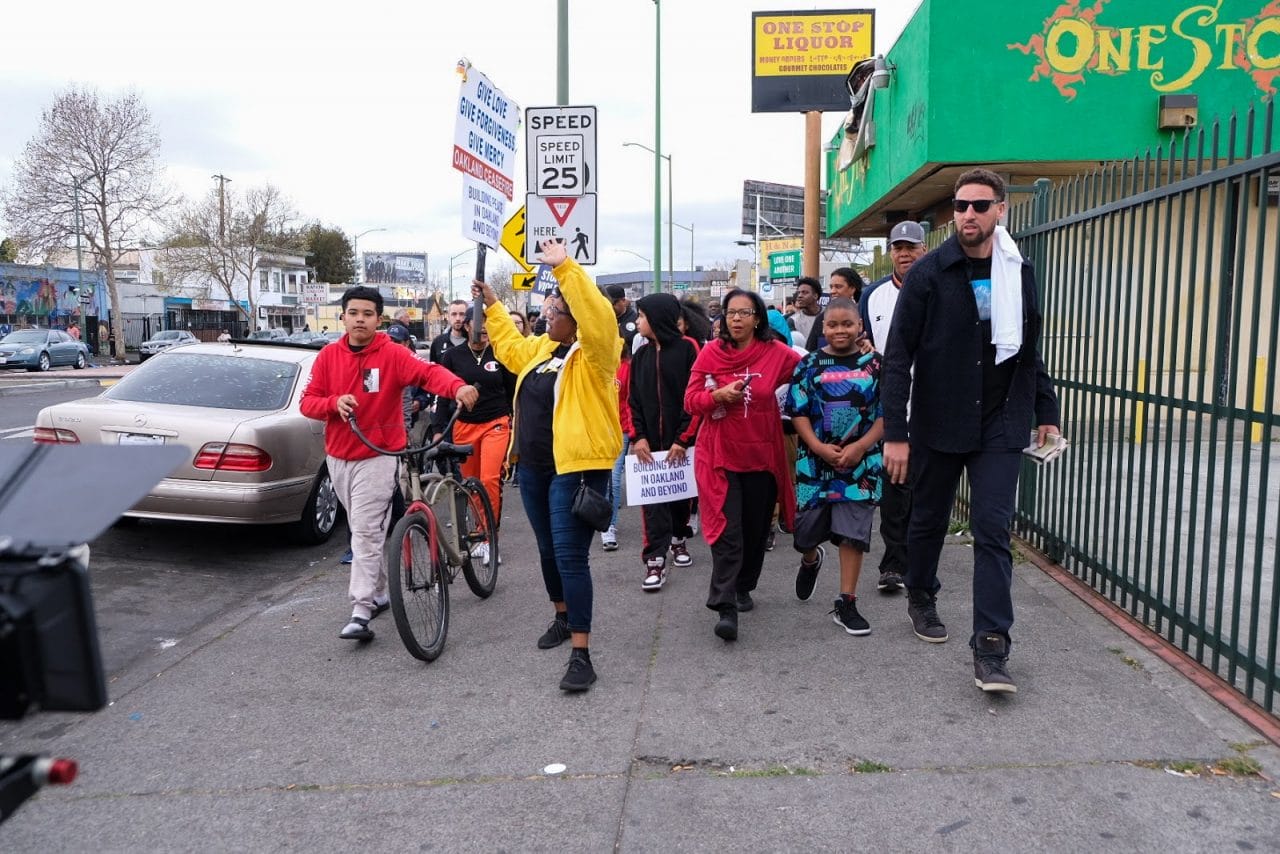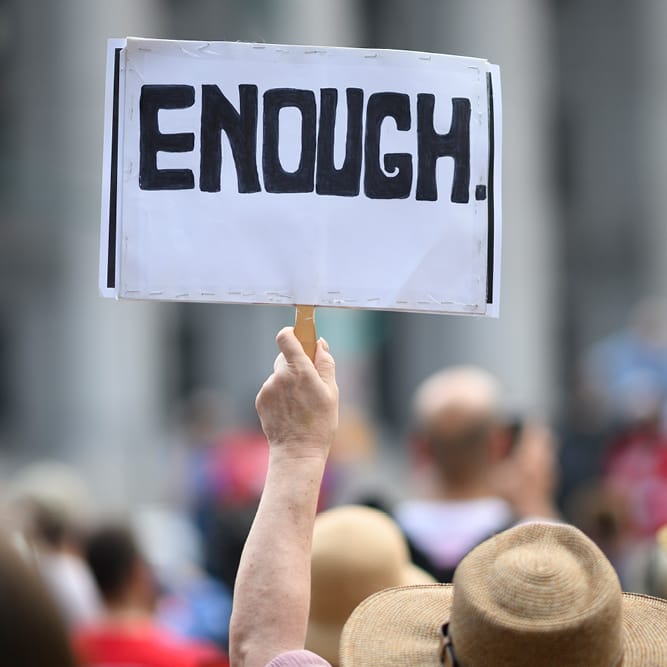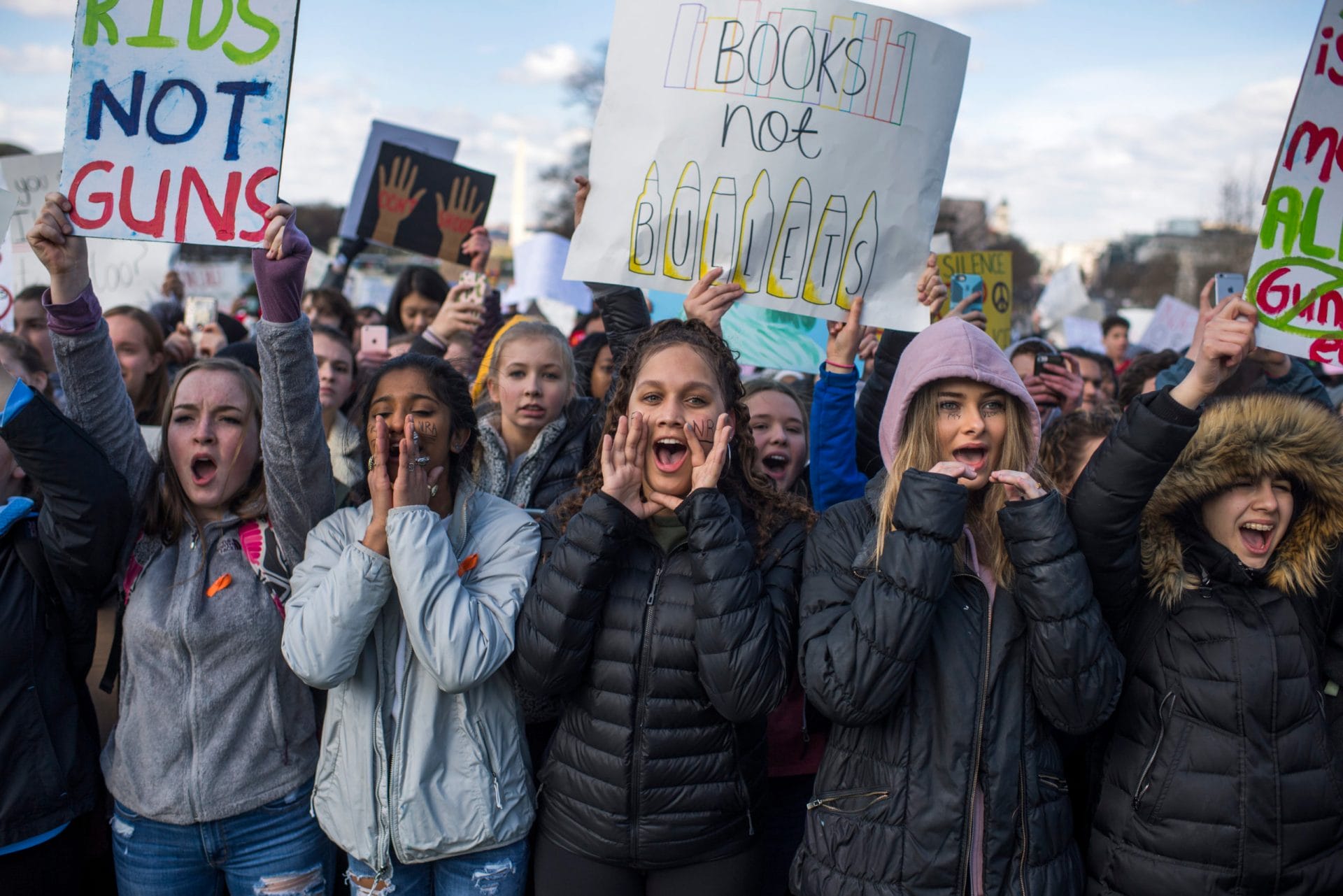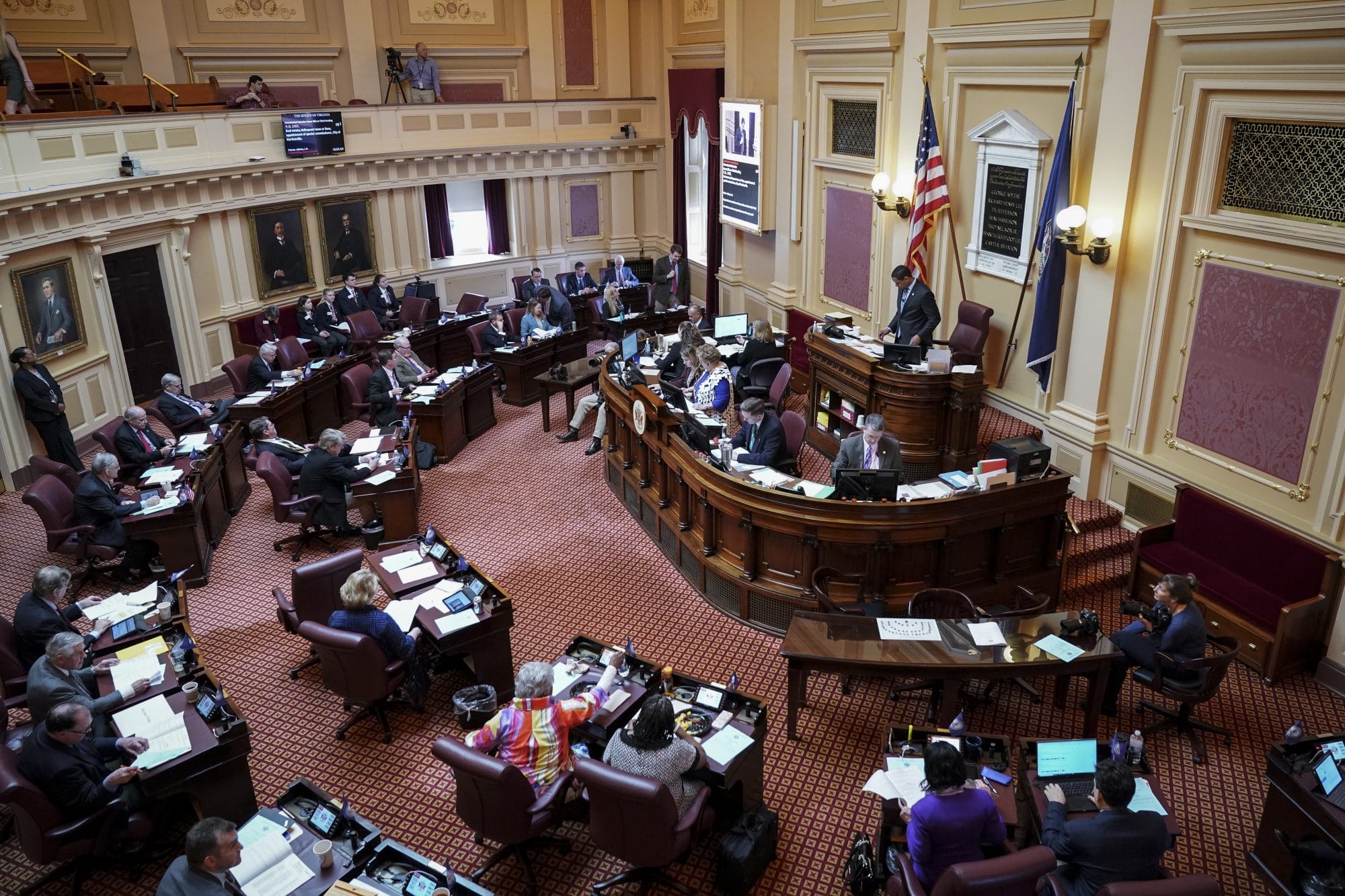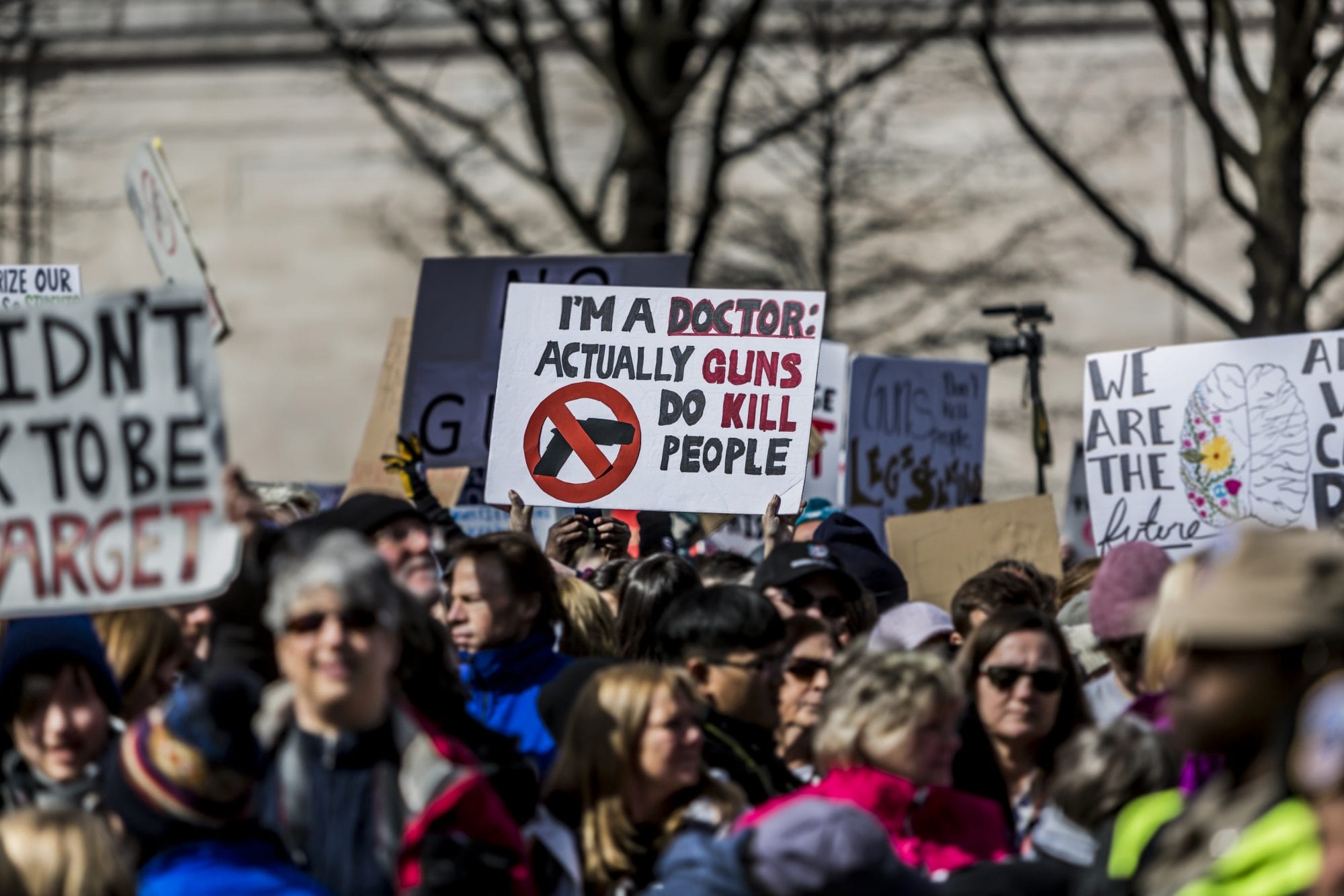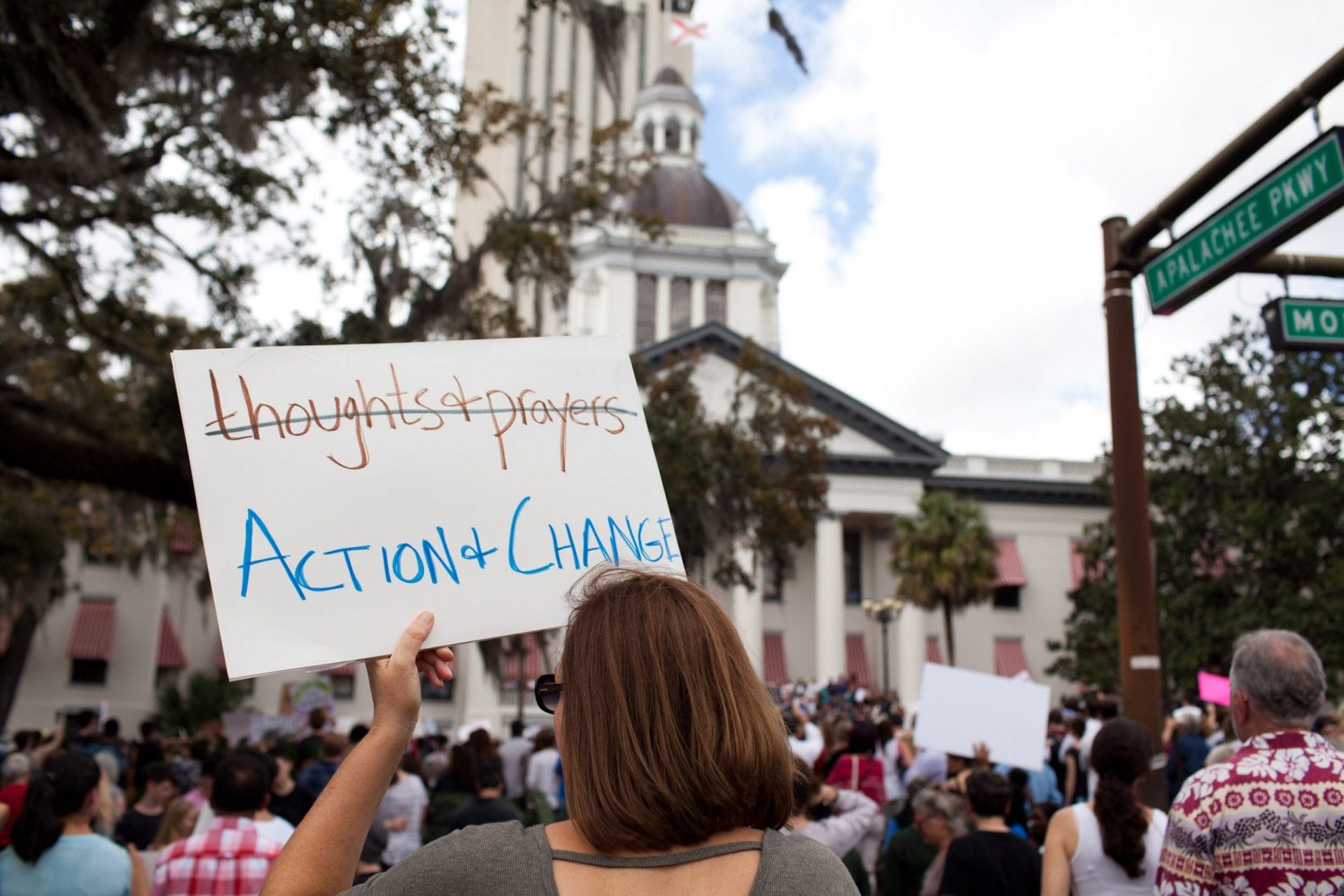
Giffords Law Center Gun Law Trendwatch: April 26, 2022
A Roundup and Analysis of the Latest State Firearm Legislation
Mass Shootings Do Happen in States with Strong Gun Laws. That Doesn’t Mean Gun Laws Don’t Work
Every other week during the state legislative cycle, Gun Law Trendwatch breaks down trends in the gun violence prevention universe. We take an in-depth look at a topic of particular interest to legislators and advocates—this week it’s why strong gun laws do prevent gun violence, even if mass shootings still occur—and provide updates on significant gun safety and gun lobby bills as they move through state legislatures.
State of the States
Year After Year, States with Strong Gun Laws Have the Lowest Gun Deaths in the Nation
The same day a man who espoused far-right, racist rhetoric online shot 10 people on a subway in Brooklyn, far-right radical Congresswoman Marjorie Taylor Greene tweeted “Pass Constitutional Carry in New York and crime will drop to extremely low levels. Gun control laws only create victims bc bad guys don’t care about laws. Allow people to defend themselves and others.”
This is a familiar refrain that Americans hear following highly publicized mass shootings in states with strong gun safety laws like New York—that gun laws don’t work to prevent gun violence, only guns do. This couldn’t be further from the truth.
Source
Andrew Anglemyer, Tara Horvath, and George Rutherford, “The Accessibility of Firearms and Risk for Suicide and Homicide Victimization among Household Members: A Systematic Review and Meta–Analysis,” Annals of Internal Medicine 160, no. 2 (2014): 101–110.
The overwhelming majority of deaths from gun violence in the United States are not the result of mass shootings like the Brooklyn subway shooting. Six in 10 gun deaths in the US are suicides, the vast majority of which can be prevented when people in crisis do not have easy access to firearms. Data shows that states that have waiting periods, extreme risk protection order laws, and background checks have lower rates of gun suicides.
The other four out of 10 gun deaths in the US each year are nearly all the result of domestic violence and interpersonal homicides that disproportionately impact underserved communities of color. States that make sustained, meaningful investments in community violence intervention programs and have strong gun laws can reduce homicides in urban areas. And states that have passed laws making it harder for people who commit domestic abuse to access firearms have significantly lower rates of intimate partner gun homicides.
It is no surprise, therefore, that year after year, states with strong gun laws, including New York, have the lowest gun deaths in the nation, whereas states with weak laws have the highest.
Such inconvenient truths don’t seem to be impacting gun zealot legislators like Marjorie Taylor Greene, who are racing to weaken gun laws and radicalize voters with extremist rhetoric around guns. So far in 2022, four states—Alabama, Georgia, Indiana, and Ohio—have repealed longstanding laws that required people to get a permit, a background check, and, in some cases, firearm safety training, before carrying a loaded handgun in public.
Trafficking & Straw Purchasing
Unfortunately, the harmful effects of loosening gun regulation are not limited to the states that pass them. In 2020, the state with the highest gun death rate in the nation (110% higher than the national average), Mississippi, also had the highest rate of exporting guns out of state to be used in crimes. Along those lines, many people who commit violence in New York get their guns from people who trafficked them from Georgia—a state with weak laws and a higher gun export rate.
The fact that we have more guns than people in this country means that people in crisis, like the Brooklyn shooter, have very easy access to lethal weapons. We can, however, change this outcome. Comprehensive, strong state and federal laws combined with a cultural shift in the narrative that guns equal safety will move the needle.
But until then, red and blue states will likely remain at a standoff, with blue states passing evidence-based laws that work and red states ignoring such data to loosen gun regulations at the peril of all Americans.
JOIN THE FIGHT
Gun violence costs our nation 40,000 lives each year. We can’t sit back as politicians fail to act tragedy after tragedy. Giffords Law Center brings the fight to save lives to communities, statehouses, and courts across the country—will you stand with us?

Gun Safety Spotlight
Gun Violence Is at Crisis Levels in Philadelphia, but New Funding and Programs Provide Hope
Philadelphia, the birthplace of American independence, has sadly been in the news recently for surging gun violence in communities already disproportionately impacted by violence. In a 24-hour span between April 14 and 15, 24 people were shot in the city, over twice as many as were shot in the Brooklyn subway shooting earlier this month.
Historically, addressing interpersonal community violence in urban areas has not received as much support and attention as high-profile mass shootings involving white, middle class Americans. But this has started to change over the past decade, with several states making meaningful, sustained investments in community-led violence intervention (CVI) programs. Funding for CVI programs is popular: In Pennsylvania, 60% of people polled said they would be more likely to vote for a Senate candidate who supported allocating funding for such programs.
Over the past two years, both the state of Pennsylvania and the city of Philadelphia have begun to direct significant funding towards these programs. The state allocated $30 million in funding for CVI programs already in 2022, with $15 million of that going directly to Philadelphia programs. Two 2023 budget bills (SB 1060 and HB 2220) would allocate $35 million to CVI statewide. A competing bill (SB 1100) would allocate $30 million towards CVI.
Philadelphia also allocated $6.6 million to two CVI programs this year: the Group Violence Intervention initiative and the Community Crisis Intervention Program. Though newer funding efforts such as these still have hurdles to overcome and implementation issues to address, this funding is an important step in the right direction.
During this crisis of gun violence in the city, community members, leaders, and advocates are continuing to innovate new solutions to the crisis. In late 2021, several organizations came together to develop the West/Southwest Collaborative Response to Gun Violence, which aims to house several government, grassroots, and academic groups in a shared space to facilitate communication and resource allocation. The city opened evening resource centers to connect at-risk youth to support services. And two Philadelphians from communities hard hit by violence developed the Philly Truce app to allow feuding individuals to get help de-escalating conflicts and use mediation services.
The gun violence crisis in Philadelphia, and in cities across the United States, is incredibly complex, and it was only aggravated by the events of 2020 and 2021. But concerted efforts to address the problem, like what we’re seeing in Philadelphia, is encouraging and hopeful.
Gun Lobby Extremism
The Party of “Back the Blue” Ignores Police Opposition to Permitless Carry
“I think it would probably cause an increase in gun crimes,” said an officer in Georgia. “[People without permits] will just be able to carry whenever they want. No one can stop them, no one can question them, and it’s just a bad deal all the way around,” stated a deputy in Baldwin County, Alabama.
These are the statements of law enforcement officers who opposed permitless carry legislation in their states. The Indiana State Police superintendent went as far as warning legislators that permitless carry will put the lives of the more than 18,000 police officers in the state at risk. Their concerns were ignored by state legislators who passed the bills anyway in 2022.
Despite professing to be the party of pro-law enforcement, Republicans have been passing extreme policies that harm the police—most notably, they have been hard at work repealing longstanding laws that require people carrying handguns in public to get a permit and background check, in spite of significant law enforcement opposition. Of the 21 states that have passed permitless carry in the past seven years, nearly all of them had trifecta Republican control of the state government.
The president of the Fraternal Order of Police of Ohio, an organization representing over 24,000 law enforcement officers in the state, penned an op-ed on December 21, 2021, in which he wrote, “Legislators don’t want to hear the concerns of the men and women who keep your family safe. They aren’t interested in the balance between public safety and individual freedom. . . . This isn’t putting public safety first and it’s not putting public safety officers first.” Ignoring the pleas of law enforcement officials, Ohio enacted permitless carry on March 14.
States that actually care about the safety of their officers will listen to those officers. To truly “Back the Blue,” legislators must reject gun extremist ideology and vote against or repeal permitless carry in their states.
MEDIA REQUESTS
Our experts can speak to the full spectrum of gun violence prevention issues. Have a question? Email us at media@giffords.org.
Contact
Bills in Motion
In the first few weeks of 2022, courageous state legislators have introduced bills to strengthen background check requirements, fund proven community violence intervention programs, improve domestic violence prohibitions, and regulate or prohibit ghost guns in 39 states. Meanwhile, the gun lobby continues to push its dangerous guns in schools and permitless carry bills in over a dozen states. We’re committed to helping state legislatures enact laws that will make our communities safer and push back against harmful gun lobby legislation.
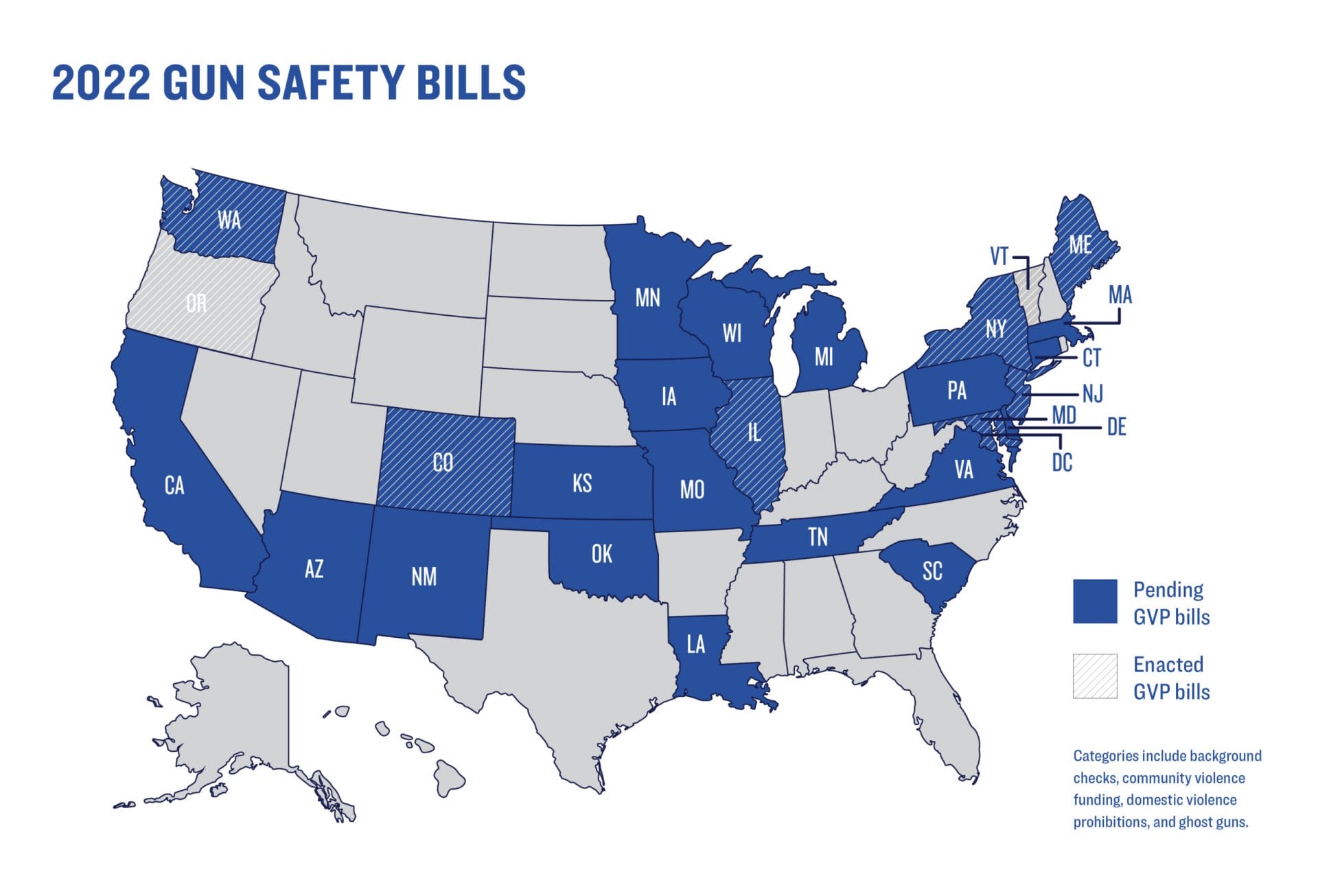
Gun Safety Bills
- BACKGROUND CHECKS: At least eight states have bills pending that would require all gun buyers to be subject to background checks, or would strengthen existing background check laws.
- COMMUNITY VIOLENCE: Illinois HB 900 and Michigan SB 82 were enacted. Oregon HB 5202 was enacted. New York SB 8000, SB 8003, and SB 8004 were enacted. Maryland HB 1005 and SB 350 have been sent to the governor. California AB 2253, AB 2534, and AB 2697 have hearings scheduled for 4/26 and AB 1929 has a hearing on 4/27. Colorado SB 145 and Connecticut SB 477 had hearings on 4/22. Minnesota HB 4608 had a hearing on 4/25. Connecticut HB 5037, HB 5399, SB 16, and SB 477 all passed committees. Minnesota HB 4608 has passed a committee. Pennsylvania SB 1100 passed a committee. At least 15 states and the District of Columbia have bills pending that relate to the allocation, protection, or administration of funding for evidence-based violence prevention programs.
- DOMESTIC VIOLENCE: Maine SB 551a was enacted. Connecticut SB 16 passed a committee. Maine SB 336 passed a committee. Legislation to strengthen domestic violence laws is pending in at least 14 states and the District of Columbia.
- GHOST GUNS: California SB 1327 and SB 1327 have hearings on 4/26, and AB 2156 and AB A 2552 have hearings on 4/27. California AB 1621 and Connecticut SB 16 have passed committees. Bills that would regulate or prohibit untraceable firearms are pending in at least 10 states and the District of Columbia.
Gun Lobby Bills
- GUNS IN SCHOOLS: Missouri HB 1481 has a hearing on 4/26. Dangerous bills to allow guns in school or on campus are pending in at least 11 states.
- PERMITLESS CARRY: There are reckless permitless carry bills pending in at least five states.
- STAND YOUR GROUND: Bills that make it easy to use deadly force in public and evade justice are pending in at least 10 states.
- LIABILITY FOR ENFORCING GUN LAWS: Louisiana HB 43 passed its chamber of origin and a senate committee. Bills that would make law enforcement officers or other state and local government officials personally liable for enforcing federal gun laws are pending in at least three states.
HERE TO HELP
Interested in partnering with us to draft, enact, or implement lifesaving gun safety legislation in your community? Our attorneys provide free assistance to lawmakers, public officials, and advocates working toward solutions to the gun violence crisis.
CONTACT US
